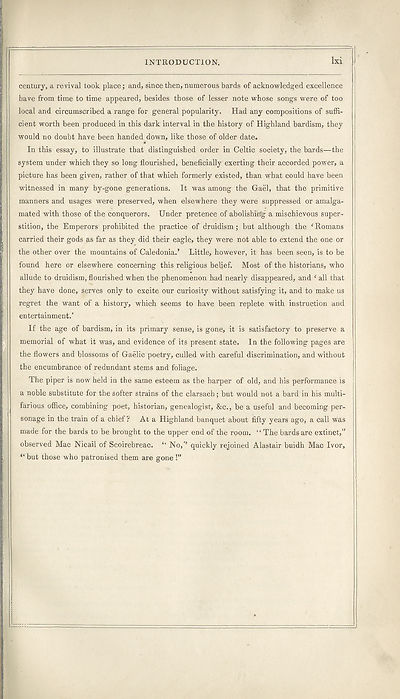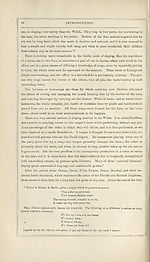Books and other items printed in Gaelic from 1871 to 1900 > Sar-obair nam bard Gaelach, or, The beauties of Gaelic poetry, and lives of the Highland bards
(73) Page lxi
Download files
Complete book:
Individual page:
Thumbnail gallery: Grid view | List view

INTRODUCTION.
Ixi
century, a revival took place; and, since then, numerous bards of acknowledged excellence
have from time to time appeared, besides those of lesser note whose songs were of too
local and circumscribed a range for general popularity. Had any compositions of suffi¬
cient worth been produced in this dark interval in the history of Highland bardism, they
would no doubt have been handed down, like those of older date.
In this essay, to illustrate that distinguished order in Celtic society, the bards—the
system under which they so long flourished, beneficially exerting their accorded power, a
picture has been given, rather of that which formerly existed, than what could have been
witnessed in many by-gone generations. It was among the Gael, that the primitive
manners and usages were preserved, when elsewhere they were suppressed or amalga¬
mated with those of the conquerors. Under pretence of abolishing a mischievous super¬
stition, the Emperors prohibited the practice of druidism; but although the ‘Romans
carried their gods as far as they did their eagle, they were not able to extend the one or
the other over the mountains of Caledonia.’ Little, however, it has been seen, is to be
found here or elsewhere concerning this religious belief. Most of the historians, who
allude to druidism, flourished when the phenomenon had nearly disappeared, and ‘ all that
they have done, serves only to excite our curiosity without satisfying it, and to make us
regret the want of a history, which seems to have been replete with instruction and
entertainment.’
If the age of bardism, in its primary sense, is gone, it is satisfactory to preserve a
memorial of what it was, and evidence of its present state. In the following pages are
the flowers and blossoms of Gaelic poetry, culled with careful discrimination, and without
the encumbrance of redundant stems and foliage.
The piper is now held in the same esteem as the harper of old, and his performance is
a noble substitute for the softer strains of the clarsach; but would not a bard in his multi¬
farious office, combining poet, historian, genealogist, &c., be a useful and becoming per¬
sonage in the train of a chief? At a Highland banquet about fifty years ago, a call was
made for the bards to be brought to the upper end of the room. “ The bards are extinct,”
observed Mac Nicail of Scoirebreac. “ No,’’ quickly rejoined Alastair buidh Mac Ivor,
“ but those who patronised them are gone 1”
Ixi
century, a revival took place; and, since then, numerous bards of acknowledged excellence
have from time to time appeared, besides those of lesser note whose songs were of too
local and circumscribed a range for general popularity. Had any compositions of suffi¬
cient worth been produced in this dark interval in the history of Highland bardism, they
would no doubt have been handed down, like those of older date.
In this essay, to illustrate that distinguished order in Celtic society, the bards—the
system under which they so long flourished, beneficially exerting their accorded power, a
picture has been given, rather of that which formerly existed, than what could have been
witnessed in many by-gone generations. It was among the Gael, that the primitive
manners and usages were preserved, when elsewhere they were suppressed or amalga¬
mated with those of the conquerors. Under pretence of abolishing a mischievous super¬
stition, the Emperors prohibited the practice of druidism; but although the ‘Romans
carried their gods as far as they did their eagle, they were not able to extend the one or
the other over the mountains of Caledonia.’ Little, however, it has been seen, is to be
found here or elsewhere concerning this religious belief. Most of the historians, who
allude to druidism, flourished when the phenomenon had nearly disappeared, and ‘ all that
they have done, serves only to excite our curiosity without satisfying it, and to make us
regret the want of a history, which seems to have been replete with instruction and
entertainment.’
If the age of bardism, in its primary sense, is gone, it is satisfactory to preserve a
memorial of what it was, and evidence of its present state. In the following pages are
the flowers and blossoms of Gaelic poetry, culled with careful discrimination, and without
the encumbrance of redundant stems and foliage.
The piper is now held in the same esteem as the harper of old, and his performance is
a noble substitute for the softer strains of the clarsach; but would not a bard in his multi¬
farious office, combining poet, historian, genealogist, &c., be a useful and becoming per¬
sonage in the train of a chief? At a Highland banquet about fifty years ago, a call was
made for the bards to be brought to the upper end of the room. “ The bards are extinct,”
observed Mac Nicail of Scoirebreac. “ No,’’ quickly rejoined Alastair buidh Mac Ivor,
“ but those who patronised them are gone 1”
Set display mode to:
![]() Universal Viewer |
Universal Viewer | ![]() Mirador |
Large image | Transcription
Mirador |
Large image | Transcription
Images and transcriptions on this page, including medium image downloads, may be used under the Creative Commons Attribution 4.0 International Licence unless otherwise stated. ![]()
| Permanent URL | https://digital.nls.uk/109809949 |
|---|
| Description | Out-of-copyright books printed in Gaelic between 1631 and 1900. Also some pamphlets and chapbooks. Includes poetry and songs, religious books such as catechisms and hymns, and different editions of the Bible and the Psalms. Also includes the second book ever published in Gaelic in 1631. |
|---|

